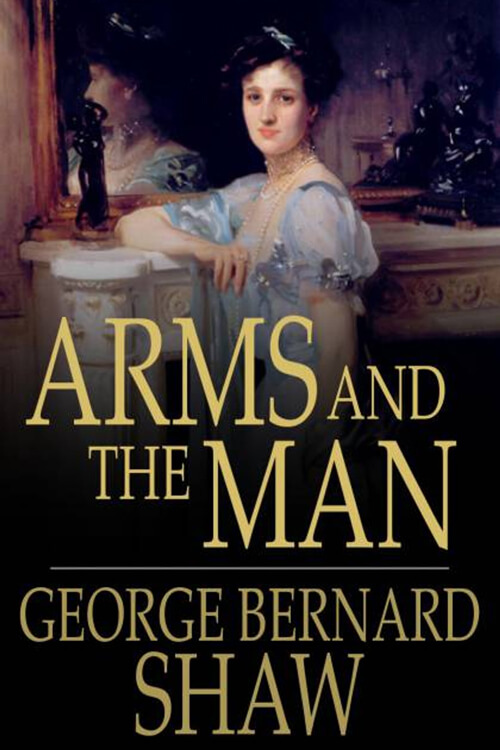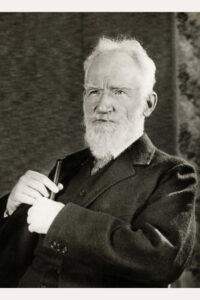
Arms and the Man
The play takes place during the 1885 Serbo-Bulgarian War. Its heroine, Raina Petkoff, is a young Bulgarian woman engaged to Sergius Saranoff, one of the heroes of that war whom she idolizes. On the night after the Battle of Slivnitza, a Swiss mercenary soldier in the Serbian army, Captain Bluntschli, climbs in through her bedroom balcony window and threatens to shoot Raina if she gives the alarm. When Russian and Bulgarian troops burst in to search the house for him, Raina hides him so that he won’t be killed. He asks her to remember that “nine soldiers out of ten are born fools.”
In a conversation after the soldiers have left, Bluntschli’s pragmatic and cynical attitude towards war and soldiering shocks the idealistic Raina, especially after he admits that he uses his ammunition pouches to carry chocolates rather than cartridges for his pistol. When the search dies down, Raina and her mother, Catherine, sneak Bluntschli out of the house, disguised in one of Raina’s father’s old coats. The war ended, and the Bulgarians and Serbians signed a peace treaty. Raina’s father (Major Paul Petkoff) and Sergius both return home. Raina begins to find Sergius both foolhardy and tiresome, but she hides it. Sergius also finds Raina’s romantic ideals tiresome and flirts with Raina’s insolent servant girl Louka (a soubrette role), who is engaged to Nicola, the Petkoffs’ manservant. Bluntschli unexpectedly returns so that he can give back the old coat and see Raina. Raina and Catherine are shocked, especially when Major Petkoff and Sergius reveal that they have met Bluntschli before and invite him to stay for lunch (and to help them figure out how to send the troops home). Left alone with Bluntschli, Raina realizes that he sees through her romantic posturing but respects her as a woman, as Sergius does not. She reveals that she left a photograph of herself in the coat pocket, inscribed “To my chocolate-cream soldier”, but Bluntschli says he didn’t find it and must still be in the coat pocket. Bluntschli gets a telegram informing him of his father’s death: he must now take over the family business and several luxury hotels in Switzerland. Louka tells Sergius that Raina protected Bluntschli when he burst into her room and that Raina really loves him.
Sergius challenges Bluntschli to a duel, but Bluntschli avoids fighting, and Sergius and Raina break off their engagement, resulting in some relief for both sides. Major Petkoff discovers the photograph in the pocket of his old coat; Raina and Bluntschli try to remove it before he finds it again, but Petkoff is determined to learn the truth and claims that the “chocolate-cream soldier” is Sergius. After Bluntschli reveals the whole story to Major Petkoff, Sergius proposes marriage to Louka (to Major Petkoff and Catherine’s horror); Nicola quietly and gallantly lets Sergius have her, and Bluntschli, recognizing Nicola’s dedication and ability, offers him a job as a hotel manager. While Raina is now unattached, Bluntschli protests that he is too old for her, being 34 and believing she is 17. On learning that she is 23, he immediately proposes marriage and proves his wealth and position by listing his inheritance from the telegram. Realizing the hollowness of her romantic ideals, Raina protests that she would prefer her poor “chocolate-cream soldier” to this wealthy businessman. Bluntschli says that he is still the same person, and the play ends with Raina proclaiming her love for him and Bluntschli, with Swiss precision, both clear up the major’s troop movement problems and inform everyone that he will return to be married to Raina precisely two weeks from that day.
Read or download Book
George Bernard Shaw
George Bernard Shaw (26 July 1856 – 2 November 1950), known at his insistence as Bernard Shaw, was an Irish playwright, critic, polemicist and political activist.
Biography
His influence on Western theatre, culture, and politics extended from the 1880s to his death and beyond. He wrote more than sixty plays, including major works such as Man and Superman (1902), Pygmalion (1913) and Saint Joan (1923). With a range incorporating both contemporary satire and historical allegory, Shaw became the leading dramatist of his generation and, in 1925, was awarded the Nobel Prize in Literature. Born in Dublin, Shaw moved to London in 1876, where he struggled to establish himself as a writer and novelist and embarked on a rigorous process of self-education.
By the mid-1880s, he had become a respected theatre and music critic. Following a political awakening, he joined the gradualist Fabian Society and became its most prominent pamphlete. Shaw had written plays for years before his first public success, Arms and the Man, in 1894. Influenced by Henrik Ibsen, he sought to introduce a new realism into English-language drama, using his plays to disseminate his political, social, and religious ideas. By the early twentieth century, his reputation as a dramatist was secured with critical and popular successes, including Major Barbara, The Doctor’s Dilemma, and Caesar and Cleopatra. Shaw’s views were often contentious; he promoted eugenics and alphabet reform and opposed vaccination and organized religion. He courted unpopularity by denouncing both sides in the First World War as equally culpable and, although not a republican, castigated British policy on Ireland in the postwar period.
These stances had no lasting effect on his standing or productivity as a dramatist; the inter-war years saw a series of often ambitious plays which achieved varying degrees of popular success. In 1938, he provided the screenplay for a filmed version of Pygmalion, for which he received an Academy Award. His appetite for politics and controversy remained undiminished; by the late 1920s, he had renounced mainly Fabian Society gradualism and often wrote and spoke favourably of the right and left dictatorships—he expressed admiration for both Mussolini and Stalin. In the final decade of his life, he made fewer public statements. Still, he wrote prolifically until shortly before his death, aged ninety-four, having refused all-state honours, including the Order of Merit in 1946. Since Shaw’s death, scholarly and critical opinions about his works have varied. However, British dramatists have regularly rated him as second only to Shakespeare; analysts recognize his extensive influence on generations of English-language playwrights. The word Shavian has entered the language as encapsulating Shaw’s ideas and his means of expressing them.






